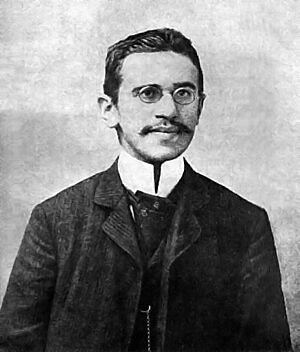Otto Weininger facts for kids
Quick facts for kids
Otto Weininger
|
|
|---|---|
 |
|
| Born | 3 April 1880 Vienna, Austria-Hungary
|
| Died | 4 October 1903 (aged 23) Vienna, Austria-Hungary
|
| Education | University of Vienna (PhD, 1902) |
| Era | 20th-century philosophy |
| Region | Western philosophy |
| School | Idealism Kantian ethics |
|
Main interests
|
Philosophy, logic, psychology, genius, gender, philosophy of religion |
|
Notable ideas
|
All people have elements of both femininity and masculinity Logic and ethics are one Logic is tied to the principle of identity (A=A) |
Otto Weininger (born April 3, 1880 – died October 4, 1903) was an Austrian philosopher. He lived in the Austro-Hungarian Empire. In 1903, he published a famous book called Geschlecht und Charakter, which means Sex and Character. This book became very popular after he died at a young age.
Weininger's ideas influenced other thinkers. These included Ludwig Wittgenstein and James Joyce. It is important to know that some parts of his work were later used by the Nazi regime. However, Weininger himself disagreed with the ideas about race that the Nazis promoted.
Contents
Otto Weininger's Early Life and Studies
Otto Weininger was born in Vienna on April 3, 1880. His father, Leopold, was a goldsmith, and his mother was Adelheid. His family was Jewish.
After finishing primary and secondary school, Otto started studying at the University of Vienna. This was in October 1898. He focused on philosophy and psychology. He also took classes in natural sciences and medicine.
Learning Many Languages
Weininger was very good at learning languages. He learned Greek, Latin, French, and English when he was young. Later, he also learned Spanish and Italian. He could also understand Swedish, Danish, and Norwegian.
At the university, he went to the Philosophical Society. Here, he listened to many important thinkers. His professors, Friedrich Jodl and Laurenz Müllner, approved his main university paper. He earned his Ph.D. degree in July 1902. Soon after, he became a Protestant.
Weininger's Travels and Book
In 1902, Weininger traveled to Bayreuth, Germany. There, he saw a play called Parsifal by Richard Wagner. This play made a big impression on him.
He then traveled through Dresden and Copenhagen. He ended up in Christiania (now Oslo, Norway). In Oslo, he saw another play, Peer Gynt by Henrik Ibsen.
Publishing Sex and Character
When he returned to Vienna, Weininger felt very sad at times. He thought about ending his life. But after talking with his friend Artur Gerber, he decided it was "not yet time."
In June 1903, after working hard for many months, his book was published. It was called Sex and Character: A Fundamental Investigation. The book included his university paper and three important new chapters. These chapters discussed the nature of women, Judaism, and how women relate to humanity.
The book was not seen as bad, but it did not become famous right away. A professor named Paul Julius Möbius accused Weininger of copying ideas from others. Feeling very disappointed, Weininger left for Italy.
His Final Days
After his trip, he came back to Vienna. He spent his last five days with his parents. On October 4, 1903, Otto Weininger died in the Vienna General Hospital. He was buried in the Matzleinsdorf Protestant Cemetery in Vienna.
How Weininger Influenced Others
Otto Weininger's ideas had a big impact on other philosophers. One of the most famous was Ludwig Wittgenstein.
Wittgenstein's Thoughts on Weininger
Ludwig Wittgenstein read Weininger's book when he was a schoolboy. He was very impressed by it. Later, Wittgenstein said that Weininger was "a great genius." He even recommended the book to his friends.
However, Wittgenstein did not agree with all of Weininger's ideas. He once wrote to his friend G. E. Moore: "It isn't necessary or rather not possible to agree with him but the greatness lies in that with which we disagree. It is his enormous mistake which is great." This shows that Wittgenstein found Weininger's ideas powerful, even when he thought they were wrong.
Weininger's Work and the Nazis
Some parts of Weininger's writings were later used by Nazi propaganda. This happened even though Weininger strongly disagreed with the ideas about race that the Nazis believed in. He actively argued against them.
Portrayals in Media
Otto Weininger has been shown in films. For example, the actor Paulus Manker played him in the movie My 20th Century (1989). This film was directed by Ildikó Enyedi.
Weininger's Published Works
- Geschlecht und Charakter: Eine prinzipielle Untersuchung, nineteenth, unchanged edition with a picture of the author (Vienna and Leipzig: Wilhelm Braumüller Universitäts-Verlagsbuchhandlung Gesellschaft M. B. H., 1920).
See also
 In Spanish: Otto Weininger para niños
In Spanish: Otto Weininger para niños
 | Jewel Prestage |
 | Ella Baker |
 | Fannie Lou Hamer |


